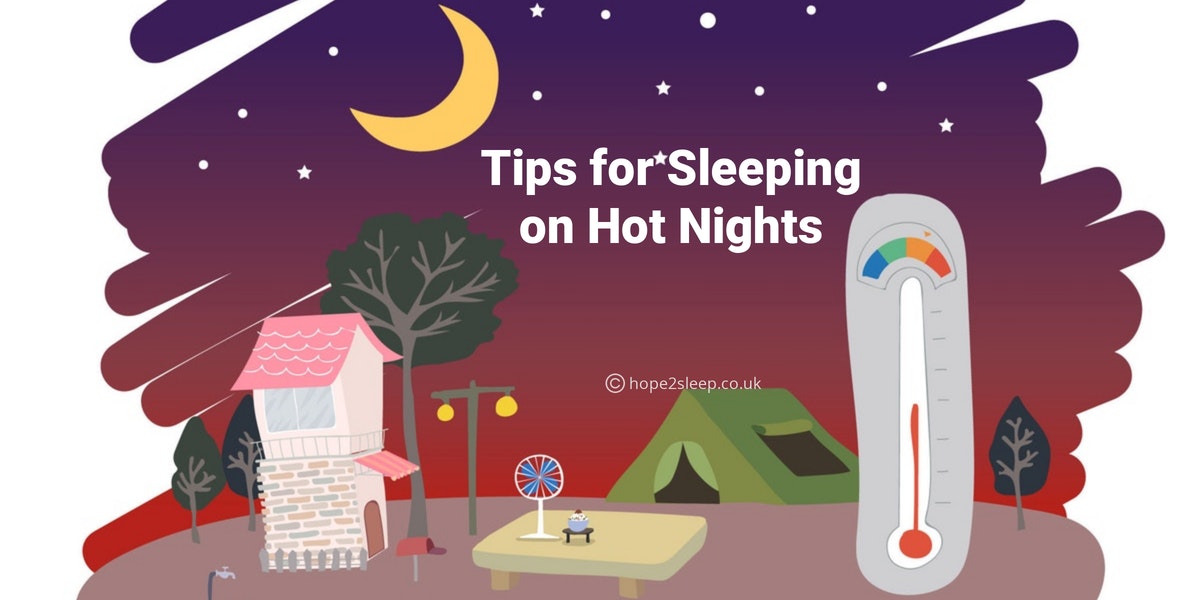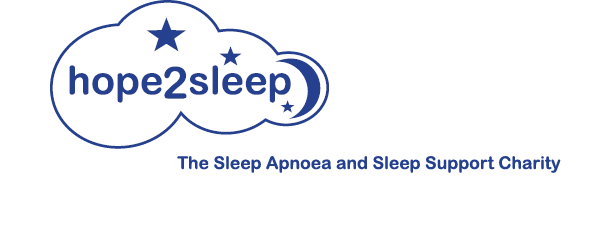Tips for Sleeping on Hot Nights1 Comment30 June 2018 | Kath Hope Tips for Sleeping on Hot Nights
Sleeping on hot nights is certainly challenging, and even for people without a sleep disorder who need to wear a mask, as getting the best sleep as possible during hot spells will have an affect on how they feel the following day. Plus, for those of us who aren't fortunate to have good weather for most of the year, we want to enjoy these sunny days and take advantage of the free Vitamin D! These tips are given by Kath Hope, Founder & CEO of the Hope2Sleep Charity who uses a mask for sleeping and Hope2Sleep's Chairman, Samantha Backway, a specialist sleep nurse who regularly educates her own patients in the sleep clinic who struggle sleeping with their CPAP during hot weather. The first section are tips for everyone, regardless of whether or not you need to wear a mask during sleep:- - Keeping the curtains or blinds drawn during the day will keep the bedroom cool.
- Create a through draught by opening windows at the front and back of the house and leave the bedroom doors open.
- Try hanging a damp sheet in front of open window as this can create cool breeze.
- For those fortunate to have air conditioning then keeping it running during the day will help cool the bedroom, but it is not always recommended to keep it on during the night, as Kath found out when once on holiday in Spain. She says...
"I woke up in the night feeling very ill with my head throbbing and an extremely bad sore throat. This progressed into a full blown chest infection, and it was the Spanish chemist who told me that air conditioning during sleep can make people ill. I later also found out that there have been studies stating air conditioning can affect the body's ability to produce natural hormones, and some of these hormones work to naturally assist with our immune system."
See this article by an air conditioning company 'can air conditioning when sleeping make you ill?'
- Sleeping with the windows open help most people, but those with allergies need to be careful and especially during periods of high pollen. Applying some safe cream around the base of and inside the nostrils can help prevent fine pollen particles entering the nose, but no cream containing petroleum jelly should be inserted into the nostrils. In fact if you read the packaging on Vicks 'VaporRub' you will see one of the warnings actually states:- "DO NOT swallow or apply directly into the nostrils, eyes, mouth or face." Please see our separately article about this.
- A fan helps many people and is even better when it's an oscillating one so that the cold air isn't blowing constantly directly at us when we sleep which can cause dry eyes, nose and skin. Another tip with a fan is to face it towards an open window to blow the hot air out.
- Dehumidifiers in the room can be helpful for many people.
- Cotton sheets are better than a duvet or satin/silk material - in the same way that silk nightwear tends to cause sweating on hot nights.
- Bear in mind that the pillow you're sleeping on could be creating extra heat. There are some good choices of pillows which help prevent heat, such as buckwheat pillows (which have other health benefits too), bamboo pillows and even 'cool' or 'chill' pillows advertised, although we've never tried those ourselves. A cotton pillow case will also be more cooling and satin pillow cases which also help prevent face creases and marks.
- If you have enough room in your freezer, pop the duvet or bedding in a bag and place in the freezer for a while before bedtime.
- Remember to wear sun cream during the day, as there's nothing worth than trying to sleep with sunburn.
- Also remember to drink plenty of water during the day, perhaps just a glass before bed and leave one on your bedside table to take small sips from if you wake up feeling dry during the night, as too much may cause the need for multiple bathroom trips.
- Just like when feeling ill with a high temperature, placing a wet flannel on your forehead can cool you down, and the same will work when sweating from the heat. Also try placing a chilled gel pad on the back of the neck.
- Turn off unnecessary electrical devices in the bedroom as they create extra heat.
- Put a hot water bottle full of cold water in the freezer or even just fill one with cold water to take to bed with you.
- A cold shower before bed can help, but for those not brave enough, a lukewarm shower instead.
- Place your feet outside the covers as cool feet will help cool down the rest of your body.
- If all the above fails and you're still struggling to sleep, and especially if your bedroom is upstairs, it may be worth considering sleeping downstairs for a while, due to the fact heat rises so upstairs is often warmer than downstairs.
As well as the above tips, below are some more specifically for people who sleep with CPAP and non-invasive ventilation masks:- - Place the mask inside a bag and put in the fridge for an hour or two so it's nice and cold when you put it on. If you use mask liners leave the liner attached to the mask inside the bag.
- Mask Liners can be very helpful, and the Silent Night Liners our charity sell absorb moisture (sweat) and wicking it away from the skin, as well as soaking up any saliva from the mouth.
- If you have a spare mask, keep it handy nearby, then if you do wake with moisture in it which can cause mask leaks, swap to the clean dry mask.
- For a quick cool down, remove the tubing from the mask and waft it for a short while over your face and neck. (Do remember though that if your machine is programmed to stop when the mask is removed it might switch itself off).
- Turn down the heat on your humidifier (some people even put ice cubes inside it, made from the same kind of distilled or previously boiled water they use in their tank, and turn the setting to zero). You may even find you don't need a humidifier during very hot periods.
- Use sun cream to protect your skin as there's nothing worse than applying the mask onto a burnt nose on skin but do make sure all traces of the cream or oil are removed before putting on the mask as mask leaks will no doubt happen! If you've not managed to protect your skin from burning during the day, be very careful about using any after-sun near the mask as most creams like that will contain alcohol or petroleum jelly (see the article warning of this petroleum-jelly-products-like-vaseline-vicks-should-not-be-used-with-cpap-niv-oxygen-masks). Instead use the CPAP Moisture Therapy Cream which contains no petroleum or alcohol and has great healing properties so should also help with any burns or sores. Cann-Ease Cream is also very good for dry or sore nostrils but if you've not got any in stock try something like KY Jelly, as it can be used safely with the masks - it just doesn't contain the healing properties of the CPAP creams.
- Apart from hayfever symptoms, many people find their noses are more stuffy as the membranes swell with the heat, and non-allergic rhinitis can also occur. This makes using the mask more uncomfortable, and as well as saline sprays (or prescribed ones) the latex-free Nasal Strips are very helpful to open up the nasal passages more. Similar ones can be bought in supermarkets or chemists.
- For nose breathers, nasal pillows masks are better during extreme heat, due to less mask contact with the face. For people who cannot nose breathe all night, there are still smaller masks available, like the DreamWear, Evora or Amara View which the charity sell, and other manufacturers have smaller masks too.
- Freeze a bottle of water and put it by the air inlet of the CPAP or ventilator to keep the air as cool as possible. It is advisable to place the bottle on a face cloth or similar so the condensation does not make the area wet.
We hope some, if not all, of these tips will help you and please let us know of others you've found. Sleep Well! Kath Hope, Founder & CEO and Samantha Backway, Chairman © Kath Hope and Samantha Backway - Hope2Sleep Charity www.hope2sleep.co.uk | |












Many a good tip in this article. Well done and thank you.